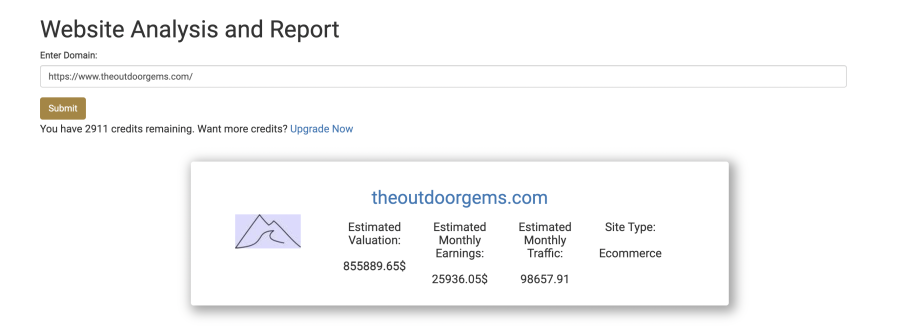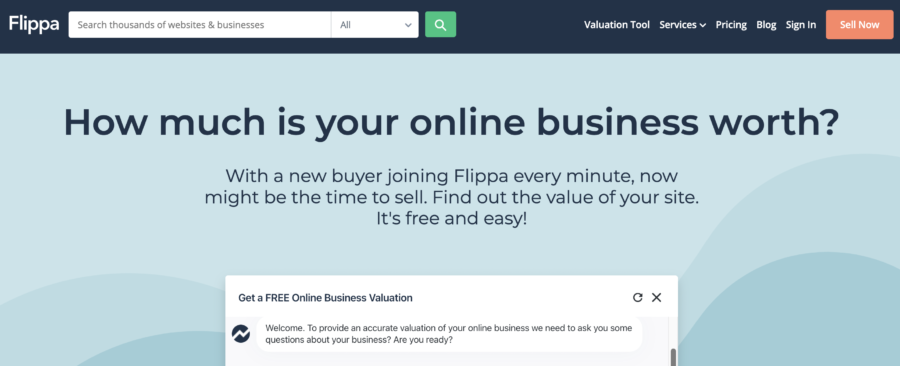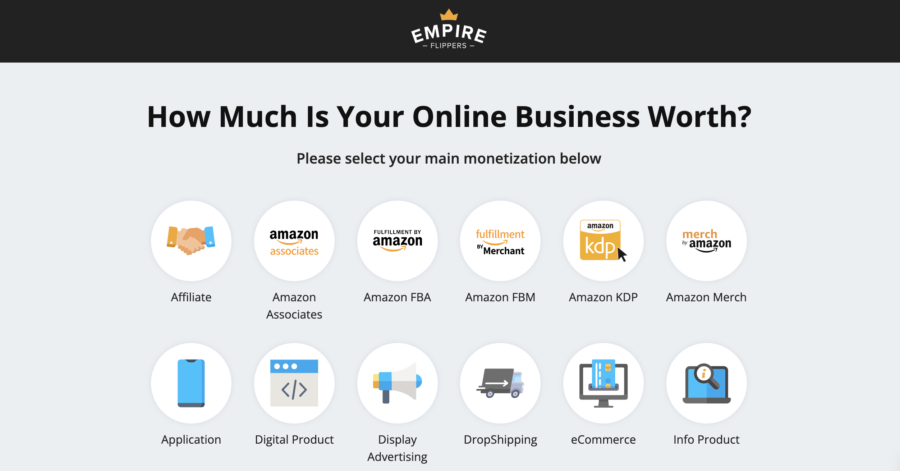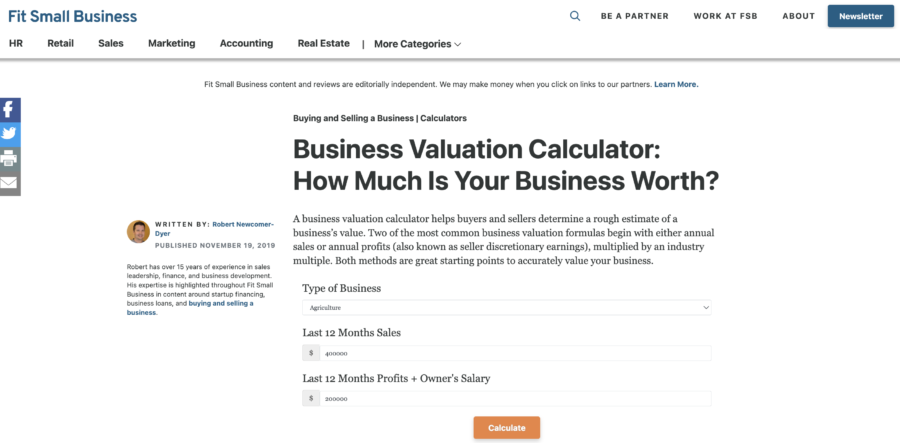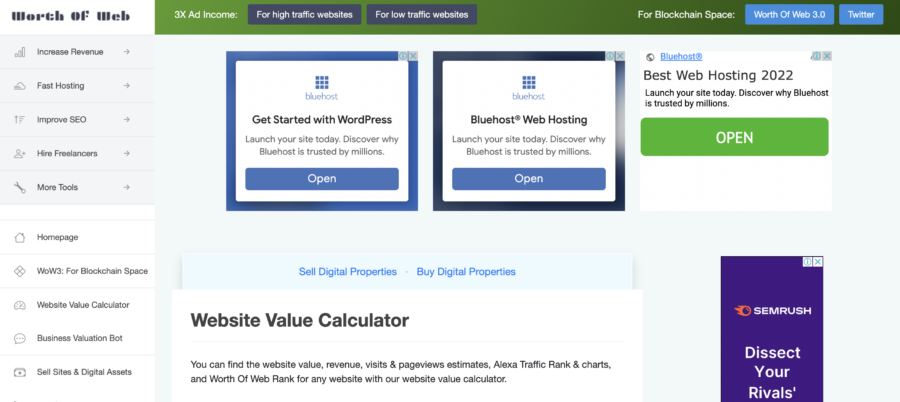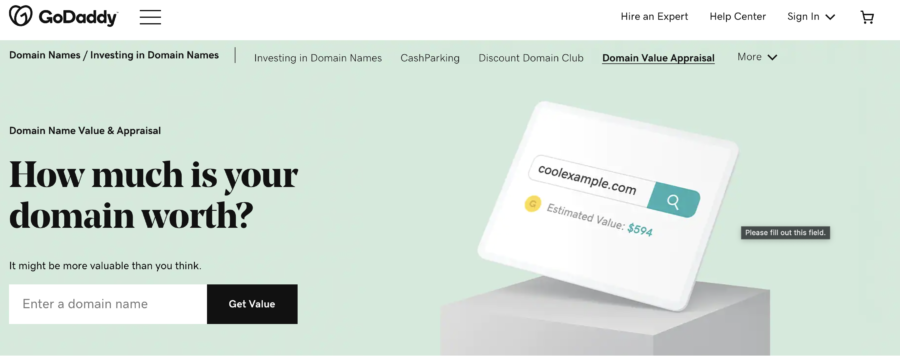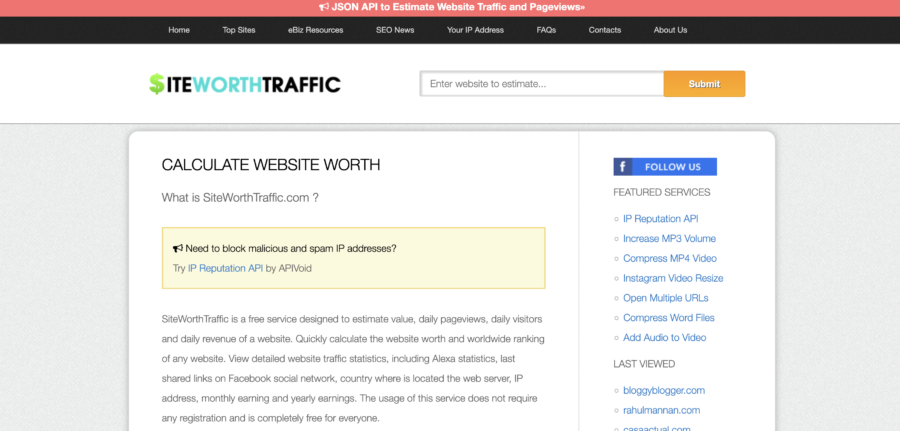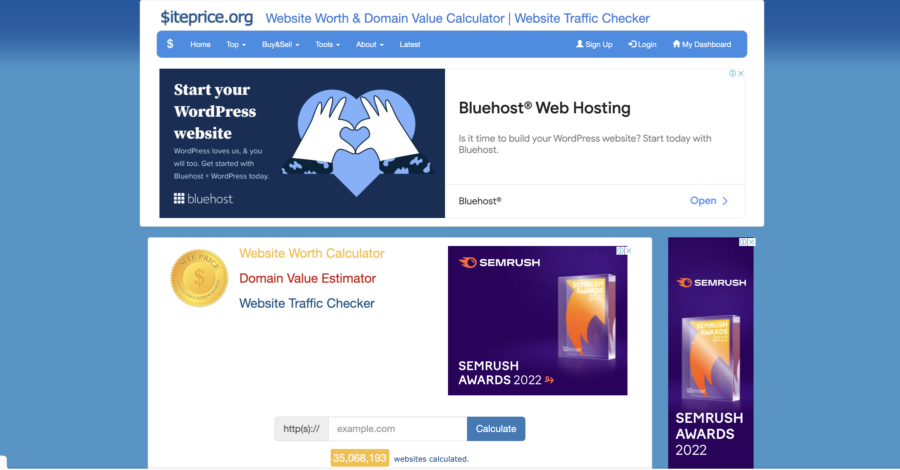When I first sold a website in 2010, there weren’t many guides out there on how to value a website. There wasn’t as established a marketplace, certainly not a standard for judging how much a website was worth.
Getting accurate estimates on what a content website is worth or could sell for is much easier now. There are standard website valuation formulas, multiple marketplaces to buy/sell, and website flipping has gone much more mainstream.
This article discusses not only how to know how much a website is worth, but also how to improve your site to increase its value for a higher selling price.
Let’s get started!
Table of Contents
Should I Sell My Website? 3 Common Reasons
Selling a website can be a big decision, especially the first one. I spent a couple of years building my first site and while selling it was the right decision, this wasn’t an instant decision.
I have a process in place to look at a website and avoid holding when I should sell, or selling when I should hold. Here are three great reasons for choosing to sell a website.
1. You’ve Hit a Ceiling
Whether it’s because I ran out of topics to create more content on without cannibalizing existing rankings, or because there was only a narrow niche of content that was open to competition compared to authoritative giants, sometimes progress stalls out.
When a site hits a ceiling or plateau, that’s a great time to look at selling. Potential is maxed out, and further time and monetary investment won’t improve results – which makes it a good time to shift those resources elsewhere.
2. You’ve Got Stuck in a Rut
Many times when I’ve found myself frustrated, I stepped back and could see that it came from being stuck in a rut. The same packed schedule, but declining returns or an unexciting plateau effect.
If I’m stuck in a rut there’s no room for new opportunities, explosive growth to get excited about, and it’s easy to make mistakes after staying in that type of rut for too long.
Selling a site requiring a lot of time, effort, & investment can free up that space for new projects that are refreshing and exciting.
3. You Want to Invest in Other Projects
Sometimes one or two projects obviously have a bigger upside than others. Or maybe I find myself losing interest in one topic while my interest in another niche only continues to grow.
Investing in other projects is a great reason to sell a website. That not only brings in capital to invest, but also allows me to shift time, energy, and focus on those projects that excite me or are showing a greater potential rate of return.
3 Valuation Methods Used for Determining Website’s Value
There are two main valuation methods used to estimate the value of a website:
- Profit based (most common method)
- Cost based / Asset based
- Estimated Earnings based
These two valuation methods can help to narrow down an estimated sales value for any content-based site.
Profit Based Valuation
This is the standard valuation process that most website brokers and/or buyers and sellers use to determine the value of a website for sale.
The basic formula is:
Last-6-month’s profit (L6M) x Monthly Multiple (MM) = Website Valuation ($)
The L6M is the average monthly profit based on the previous six months. The monthly multiple (MM) is determined by the current markets, niche, site assets, and other factors that influence the overall profile of the site on sale.
This is the most common method used by far.
Note: If the site is seasonal, use the average monthly profit of the last 12 months for a more accurate average.
Valuation multiples vary widely. The main factors affecting multiples are:
- Niche
- Site type: SaaS, content, e-commerce
- Site language and target audience country: US sites are worth more
Valuation Multiple: Currently, Flippa reports that the average multiple of sites sold in its platform is 3.03x annual profit, or 36x monthly profit.
Therefore, as a back-of-the-envelope approach, you can simply take your revenue, subtract relevant expenses such as hosting, domain name, and ads, and multiple the average of 6 months by 36. You can and should also multiply by 30 and 40 to give you a range of valuations.
Cost Based Valuation
This valuation isn’t focused on what an actual realistic selling price is, but it borrows from real estate to get a mental idea of what the invested value is.
In other words, if I needed to rebuild from scratch to get an asset the same size, authority, etc. as the one I’m looking to buy, how much would I need to pay?
This focuses on non-revenue factors like:
- Age of the site
- Number (and quality) of backlinks
- Amount of content
- Money invested in editing, formatting, programming
Generally, this method isn’t used when actually buying or selling websites, but it’s a way to get an idea of the “raw value” poured into a site’s development.
Sometimes this might come into play when looking to buy a site that was not monetized or is in the early stages of development.
Estimated Earnings Valuation
You can also value an unmonetised website by estimating the revenues the site could produce if monetised. Let’s say you found a DIY blog started by a passionate DIYer who never had the know-how to properly monetise. The site is getting 100 000 visits per month but generates 0$ in revenue.
Surely, this site isn’t worth 0$. But a cost valuation might also not be appropriate- The site owner has never hired any content writers or run any ads campaigns, so he’s spent only 3 000$ in developing this site. A 3 000$ valuation would be unfair for a site generating so much traffic.
In these situations, we can produce an estimate earning figure by arriving at an estimated RPM figure and multiplying it by a multiple.
Estimated RPM (Revenue Per Mile): RPM measures how much money a site makes per 1 000 visitors. Ad networks typically use this measure. It ranges from 10$ to 150$+, depending on niche and location of traffic.
There’s plenty of sources for RPM estimates by niche, such as the one below, from productiveblogging.com:
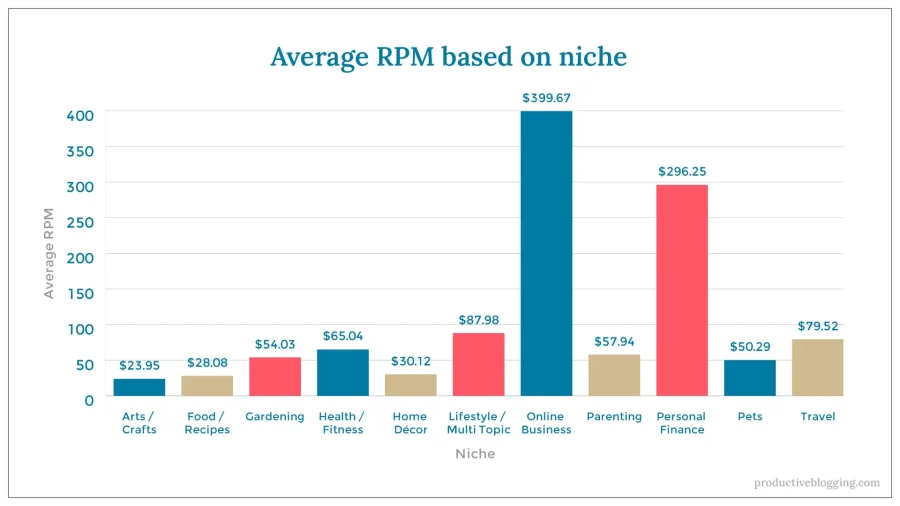
Based on this, we can see that our DIY blog would probably generate about 20$ to 30$ per thousand visitors, or 2000$ to 3000$ per month. If we multiply this by a 36x multiple, we reach a valuation of 72 000$ to 108 000$.
7 Factors That Influence Your Website’s Worth
Seven factors have a major impact on the value of a website. These are the main factors that end up determining the price of sale via revenues and/or increasing the multiple used.
1. Revenue
Revenue is the first thing that most buyers look at. I don’t want to overpay for a site, and for individuals buying sites to build passive income, this is even more important.
The revenue numbers are a major part of the equation for sale price and the fastest way to make a site more valuable on sale is to improve the average monthly revenue.
2. Profit
How much of that revenue is profit? With many content-based sites this number will be a very high percentage but costs like monthly hosting, content to maintain, paid plug-ins, and payments to editors all should be figured in.
3. Running Costs
Running costs can be as little as a few dollars a month for hosting, or it can be much higher for having a full-time editor, maintaining a server, and tech support.
The running costs aren’t just important because they increase the distance between the total revenue and total profit numbers, but they can be an indicator of how much work a site will take to maintain.
4. Domain’s “Indexed” Age
When buyers and sellers talk about a domain’s age, they mean how long search engines have been aware of the website. It doesn’t matter if the site had a one-page landing page in 2010 if Google didn’t see it until 2021.
Use the Internet Archive tool to see when a domain name was first indexed, and how consistently it appears in the past.
5. Good SEO & Rankings
Do the posts use headings and answer common questions asked in Google? Are there multiple topics and posts doing well or just one post pulling in all the traffic?
I want to see how thorough the SEO practices of the current site owners are, where posts rank, and see if there are some easy SEO wins that could help encourage a fast ramp-up.
6. Traffic Numbers, Diversity & Trends
Proven sites with good traffic numbers are in high demand. I also want to see the source of the traffic. Is it all Google? Does the site get any attention from other search engines like Bing and DuckDuckGo? What about social traffic?
Diversified traffic adds value. Trends are also important. If the traffic is cratering, that’s going to kill the value of a site. If it’s been stable over the long-term or still growing, that’s a great sign that increases what most buyers are willing to pay.
7. Revenue Streams Diversity
How do those total revenue numbers break down? Does all the revenue come from one display ad provider? Are there video ads? What about affiliate offers?
Diverse revenue streams are excellent because that means changes in rates from one won’t torpedo the entire income of the site.
7 Best Website Value Calculators
There’s no lack of website value calculators out there. Many are similar but may weigh the value of various value factors differently.
These tools should be used to get an idea of how some resources view your site, not as a hard and fast valuation.
1. Folio Findr
Folio Findr’s due diligence tool works by estimating the value of your organic traffic and multiplying by a multiple that depends on niche, monetisation, traffic countries and other variables. It is, as far as we know, the most comprehensive and accurate tool for valuing sites.
2. Flippa Valuation Tool
The Flippa Business Valuation Tool asks a variety of questions to get a sense of business type, traffic, revenues, and more. This takes a questionnaire format to start and comes back with a valuation based on the answers.
3. Empire Flippers Tool
The Empire Flippers starts with nearly 20 buttons, each representing a common type of online business. Select the correct one, then proceed to put in information that will be evaluated based on the common valuation formula for that business style.
The specific formulas for different types of businesses makes this one of the best website valuation options out there.
4. FitSmallBusiness Tool
The FitSmallBusiness valuation tool is simple and fast: put in the type of business, last 6 months sales, and last 12 months profits + Owner’s Salary and get a valuation back.
5. Worth of Web
Worth of Web is an automatic valuation tool. Type in the URL of the website to check and it uses data from common free public tools to create an estimate.
65. GoDaddy
GoDaddy’s tool does not provide valuation for existing websites. The closest thing it has is the (in)famous domain valuation tool which focuses on how much a domain name is worth and is notoriously inconsistent.
7. SiteWorthTraffic
SiteWorthTraffic pulls together estimated data on a URL you type in and brings back a report with an estimated value.
Use caution with putting too much weight on any numbers from this tool as two quick tests came back with one number far too low, and another that was much higher than expected based on my own experiences with the sites and how the market would value them.
8. SitePrice.org
Type in the domain name and let the Siteprice.org valuation tool go to work. This can take a few minutes as it uses tools to analyze estimated traffic levels and ad income, then come up with an estimate.
Main Takeaways
I didn’t do everything perfectly with the first sale. Experience makes a big difference when it comes to website flipping but a little bit of guidance can go a long way.
When it comes to determining the value of a website, remember:
- There are three major reasons for selling a site
- You should always position a site for the sale
- Understanding valuation is crucial
- Use website valuation calculators to get an idea of potential value, but understand to be cautious of putting too much weight in estimates
- When in doubt, use the profit based valuation method
Keep these in mind, get familiar with the best tools on this list, and practice the profit based valuation method and it won’t take long to become very comfortable with estimating the value of a site.



